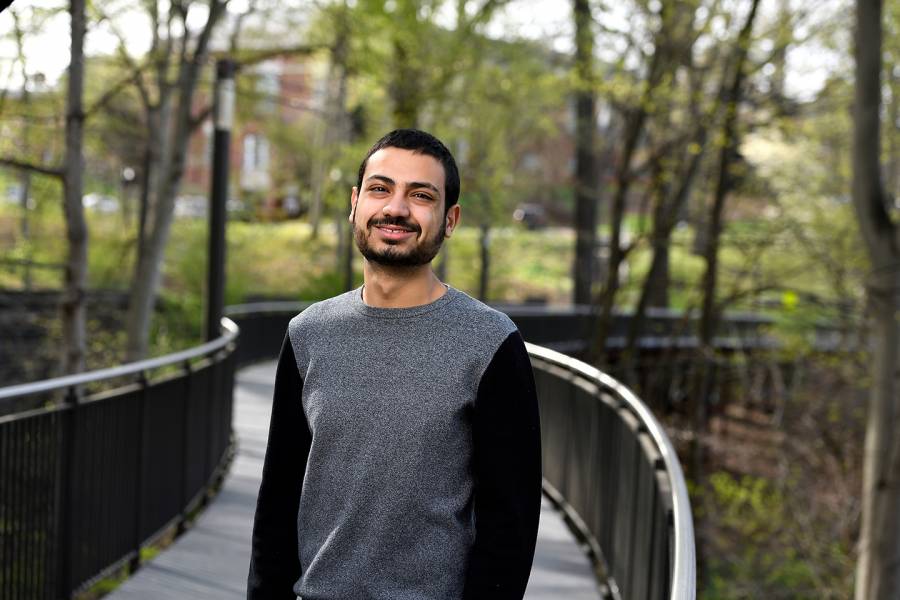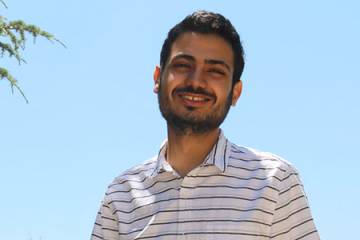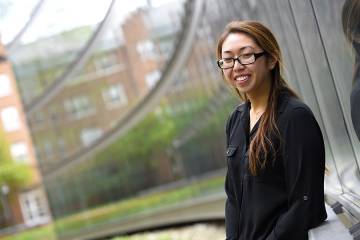Three years into his time as a student at Johns Hopkins, Anthony Boutros has already made lasting impacts at both the university and across the state of Maryland.
Boutros, a junior majoring in sociology, international studies, and public health studies, served as class president during his first two years at Hopkins and simultaneously chaired the student government's Civic Engagement Committee, which advocates for student activism and community engagement on and around the university's Homewood campus and across Baltimore.
He identified needs on campus, working with others to launch programs and organizations that support equity and inclusion among students, including the Advocates for Disability Awareness and the Hopkins branch of the March for Our Lives campaign in support of stronger gun violence prevention measures.
He also helped a Maryland nonprofit win a key legislative victory on behalf of LGBTQ youth across the state.
In recognition of his wide-ranging advocacy and activism efforts, Boutros has been selected as one of 62 students nationwide to receive the Harry S. Truman Scholarship, the premier graduate fellowship in the U.S. for those pursuing careers as public service leaders. Truman Scholars receive $30,000 toward their graduate studies and the opportunity to participate in professional development programming.
"Anthony's deep commitment to public service and civic engagement inspires others to act to better the human condition," said Andy Wilson, dean of academic and student services at JHU's Homewood campus. "He possesses exemplary skills as a scholar and advocate who has led positive transformations in the Johns Hopkins University community."
At 8 years old, Boutros and his family emigrated from Lebanon to the U.S. A second-grader at the time, he didn't understand a word of English, and he credits his family's resilience with helping him acclimate and ultimately excel in school.
Growing up, he spent his time volunteering with school and church groups. As he transitioned into college and began working with new organizations, he said, his understanding of service evolved.
"I went from thinking of service as just going out and helping someone to a more complex viewpoint," Boutros said. "Serving someone can also take the form of supporting their missions and their visions and empowering them to become advocates in their own lives by making sure they have access to the tools that they are disenfranchised from."
After his first year at JHU, Boutros interned with FreeState Justice, a nonprofit that works to support LGBTQ Marylanders with low incomes. Working with FreeState was a turning point, he said—he learned fundraising, grant writing, and organizational skills that have enriched his work on the Hopkins campus and beyond. He also helped the organization raise $85,000 in grants to work to outlaw conversion therapy for LGBTQ youth in Maryland.
Boutros' advocacy work continued during a research project this past summer as he studied different forms of gender activism in Lebanon. Sarah Parkinson, an assistant professor of political science at Johns Hopkins and Boutros' advisor on the project, said he exhibited amazing initiative with this proposal.
"The way he sees the world is with a sensitivity in the ways in which people might need to mobilize given the context in which they live," she said. "He has a larger eye towards public service, towards bettering peoples' lives in unexpected ways, and learning in different contexts from our own system of government and what needs to be done."
Boutros also led efforts to get Hopkins students registered to vote by bringing the TurboVote tool to campus. In the runup to the 2016 election, he had tried to register students but found many didn't understand the absentee ballot process or had already missed important deadlines. When post-election statistics showed low turnout among his college-aged peers, he realized students needed a simpler way to vote while they are away at school.
Boutros learned about TurboVote—a digital service that helps people register to vote, sends email/text reminders, and mails absentee ballots directly to voters—while attending the IMPACT Conference, a national gathering focused on civic engagement among college students.
After returning from IMPACT, Boutros began the process of bringing TurboVote to Hopkins, an effort that eventually netted him the Student Government Association's 2017-18 Student Excellence for Leadership and Service Award. To date, more than 2,200 members of the Hopkins community—including more than 1,000 students—have registered to vote via the platform.
After graduation, Boutros plans to pursue a JD in social justice law and a PhD in sociology. He hopes to open a clinic in law school, modeled after FreeState, to continue helping those in need, including marginalized individuals with low incomes. He said that while the Truman Scholarship funding will help him pursue his dreams, he is equally excited to attend the affiliated summer program, the Washington Institute. This special opportunity places Truman Scholars in a public service internship while deepening their understanding of the national policymaking process through programming with fellow scholars.
At the institute, he hopes to intern at the Office of Civil Rights, where he can work to support marginalized students and learn the tools he'll need to be involved in education policy.
"I would like to be a part of groups and networks that advance social justice in a broad sense, specifically gender justice, to make sure that people have equal opportunities to reach their full potential and live without poverty and without discrimination," Boutros said. "I don't think I will live to see that vision become a reality, but I think we can move ever closer to that goal if we work and keep fighting for it.
To learn more about the Truman Scholarship and to hear from Anthony Boutros, attend an information session hosted by the National Fellowships Program at JHU on Thursday, April 25, from 4-4:45 p.m. in Gilman Hall, Room 134.
Posted in University News, Student Life
Tagged scholarships










